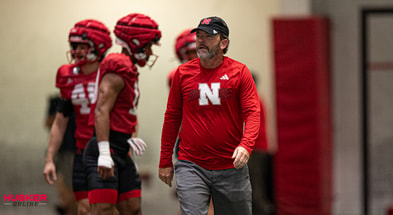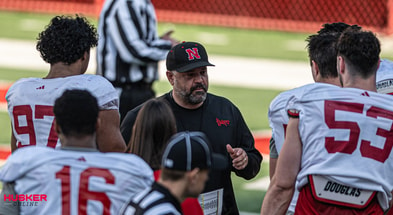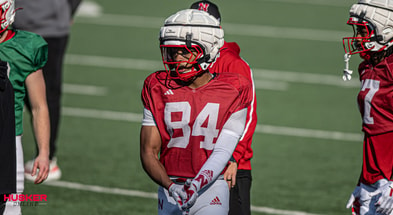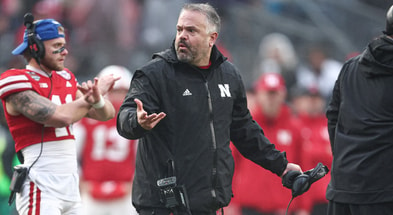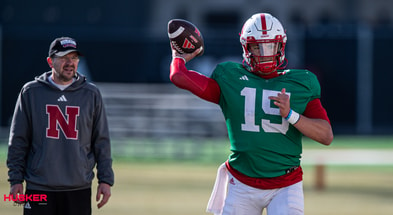Nebraska AD Troy Dannen updates the future of the Memorial Stadium project and what's next

Since Troy Dannen was hired as Nebraska’s athletic director on March 20, there’s been a giant elephant in the room.
That elephant was a $450 million Memorial Stadium project announced by former athletic director Trev Alberts on Sept. 28, 2023. The initial plans called for a complete demolition of South Stadium as early as the end of the 2024 football season.
Join HuskerOnline today and get your first month of a premium subscription for just $1!
Former University President Ted Carter was also heavily involved in putting this project into motion. Carter is now the president of Ohio State, and Alberts is the athletic director at Texas A&M.
The south end zone has roughly 23,000 seats. Nebraska has 18,320 season-ticket accounts, making up its 67,445 season-ticket holders. Student and visitor seats occupy the remainder of the stadium’s tickets.
Over the last two months, Dannen has been very careful with what’s said about the future of the Memorial Stadium project because, quite frankly, he was still trying to learn everything about it. Dannen needed to know the project’s overall scope and what made the most sense moving forward in a landscape of college athletics that continues to change by the day.
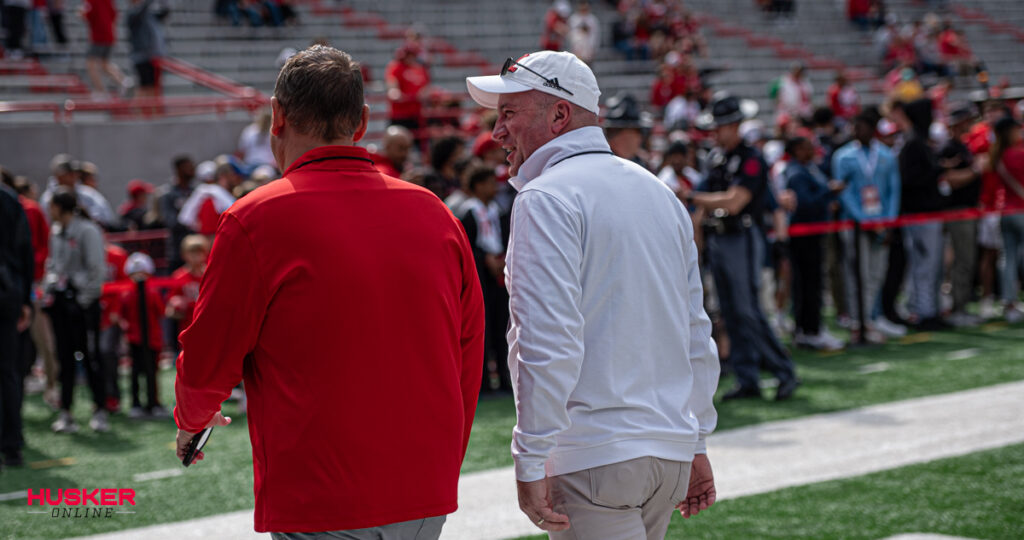
The immediate focus is now on the East and West Stadium and not the south end zone
On Thursday, Dannen met with a small group of reporters to outline the plan. In short, the project is still happening, but the map to complete it will change.
“The project remains on track,” Dannen said. “However, the timing and the sequencing is going to be different than I think might have been projected earlier. Going forward, we’re going to really focus the architects on East and West Stadium. The rationale for that quite simply is East and West (Stadium) has the potential to monetize itself.
“The landscape of what’s going on right now, the ability to generate money, I’m going to have a pretty big spot on my budget for new money that needs to be generated. I think there was speculation that the south was coming down at the end of the ’24 season. That is not happening.”
However, “The south end zone project is still a part of the scope,” he said.
None of the work, though, to the East and West stadiums will begin until after the 2025 football season. The plan is to have chair-back seating in the East and West stadiums and tie each seat to a licensing fee. The new premium East and West chair-backed seats would have access to several new in-stadium amenities.
That would also mean a stadium reseat would take place, and NU’s ticket grandfathering system, which went into effect in the 1990s, would end. Currently, a large chunk of Nebraska’s season ticket holders are grandfathered into their original donation fee, while new ticket holders might pay thousands more annually for the same seats.
Previous stories on HuskerOnline have outlined Nebraska’s grandfather ticket pricing, and our studies have found that no other stadium in the country has anything like it in terms of tens of thousands of ticket holders locked into sweetheart seat-donation prices from the 1990s.
“If the East and West project is going to generate money, it’s going to generate it from premium seat licenses for the privilege of accessing those seats, and the amenities that will go with those seats that are going to be different, new, and improved,” Dannen said. “There will be a new price tag on every seat. If that is going to happen, it has to.
“If you ever have a reseat, you have to have at least a year’s notice for your fans. In a perfect world, we’d be looking at something post-’25 into ’26 before really anything tangible inside East and West can happen.”
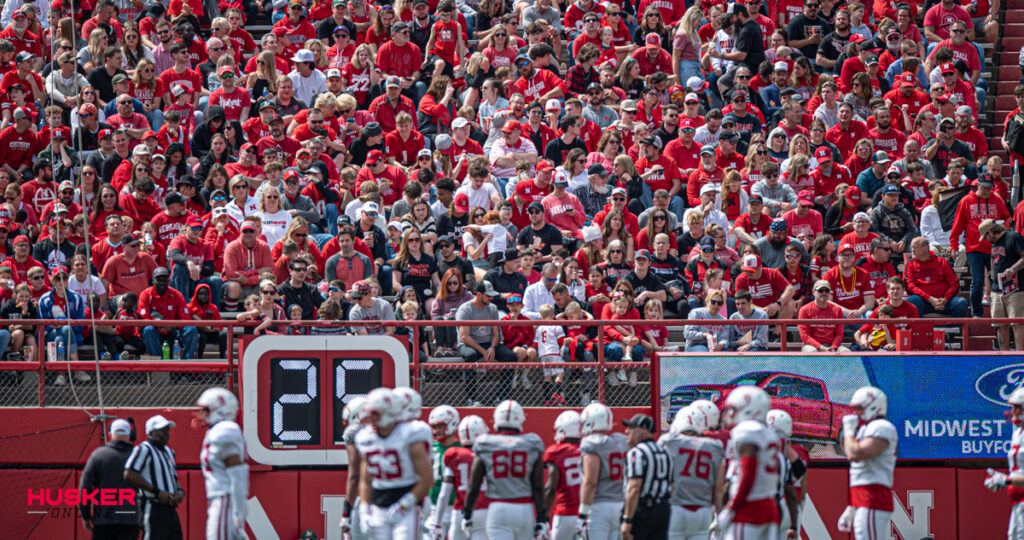
Dannen continues to explore options with South Stadium
As the focus moves to the East and West stadium for 2026, what can be done to improve and upgrade the south end zone?
The original plan called for a complete demolition, which would have forced around 23,000 ticket holders to miss at least the 2025 and 2026 seasons while it was rebuilt. Dannen wants to continue to explore options. There are no current plans to add chairback seating to the north end zone because the structure of the aisles won’t allow it.
“What I have not gotten into yet is understanding does South have to come down to rebuild South?” Dannen said. “Does it have to come down all at once? Can it come down in phases? Is there another model of that if we have an extended period of time that the whole thing doesn’t come down, but pieces of it do, and we build around it, and we never really harm the capacity?”
Another point that both Dannen and head football coach Matt Rhule brought up is neither was too wild about creating a giant wind tunnel in South Stadium for two seasons with an open end zone that currently sits 98 rows high.
“Coach and I joked, I think we understand why we were in the option for all those years, because of the wind tunnel effect,” Dannen said. “I think you really have to assess the impact on the competitiveness of the team and how we would play by the other impacts that would come if the south end zone sat empty for a season or a period of time.”
However, one thing you can expect to see new and improved stadium WiFi by this season.
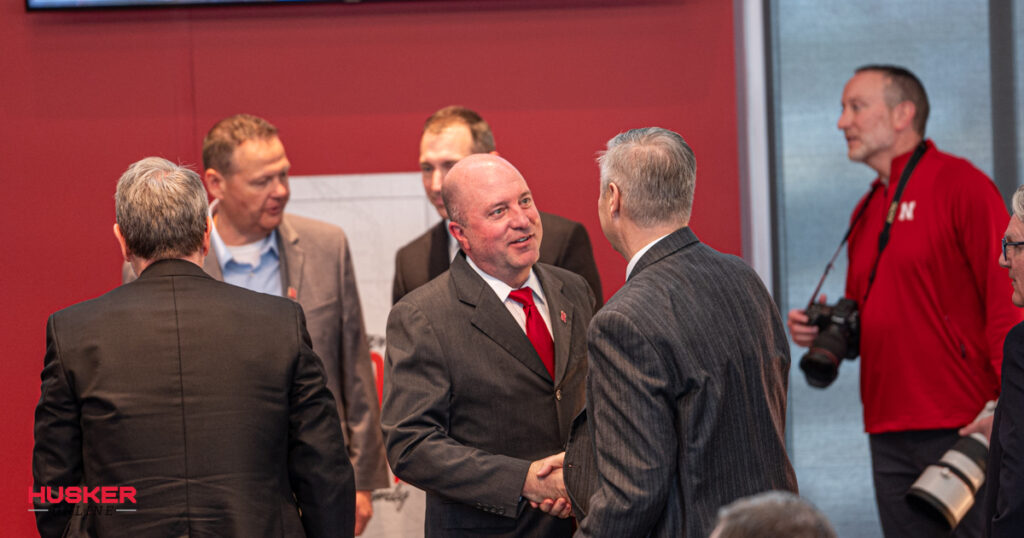
Raising the money and the overall pricetag
We don’t have answers to the overall project’s price tag or money raised thus far.
Dannen did not have answers on either topic, mainly because several unknowns remain. A big one is the role of the third-party group Nebraska Philanthropic Trust.
Top 10
- 1Breaking
Jaydn Ott
Top transfer RB signs with OU
- 2Hot
Potential landing spots
For Nico Iamaleava
- 3Trending
Mel Kiper
3-Round Mock Draft
- 4
Marcus Freeman
Reacts to Nico Iamaleava
- 5
Brian Kelly reflects
On Kyren Lacy
Get the On3 Top 10 to your inbox every morning
By clicking "Subscribe to Newsletter", I agree to On3's Privacy Notice, Terms, and use of my personal information described therein.
The NU Board of Regents contracted the Omaha group led by Sue Morris for $5.5 million to spearhead fundraising efforts for the project over the top of Nebraska’s in-house foundation and development offices.
“They still have the contract with the board,” Dannen said of Nebraska Philanthropic Trust. “I’m not sure at this point in time whether we will actively fund raise until we have a real project, until we have the drawings, until we know what’s viable, until we know what the costs are, and frankly until we know what the other effects outside of the department, the other effects of the enterprise are going to have on our ability to either carry debt or have other expenses in the budget.
“I’m not sure we’ll be doing a whole lot other than discussing the project versus actually asking because we just don’t have something right now to ask for other than support the concept.”
Thursday, Dannen also made it clear that there have been zero conversations about asking for public dollars for the stadium project.
“I anticipate at some point in time, I will ask everybody for everything,” Dannen said about raising money for the project. “Once we have a project, once we have a financial model that doesn’t compromise our ability to compete in the new world of college athletics. Really, if I’m on the other side and I read all the antitrust settlement stories right now, before you come ask me for money, I need to know what’s going to happen to the department.
“I need to know how the college athletic department is going to run and function before I’m going to financially support it. There are a lot of unanswered questions that I think our development folks would need to be prepared to answer before we get to that point.”

An on-campus hotel and entertainment district is no longer on the radar
When Alberts first began planning for his initial $450 million stadium project, one of the places he looked at for inspiration was Wrigley Field.
Omaha native Tom Ricketts owns the Chicago Cubs. Since purchasing the Cubs, Ricketts has acquired nearly all the property around Wrigley Field to create an entertainment district and built a boutique Marriott hotel across the street from the ballpark.
Alberts had grand plans of doing something similar at Nebraska, attempting to find and create new revenue streams.
Dannen said creating Nebraska’s own on-campus entertainment district is currently not on his radar.
“It’s not on my personal radar right now. I’m staying in Haymarket. I feel like we’ve got Wrigleyville two blocks away. It’s an amazing area,” Dannen said. “Now, is there more to come? I will tell you my focus is right now on getting the stadium up to speed and if things come that are around it, there will be private people who want to invest. If they feel like there’s a return, they will seek to invest around the stadium but I’m not contemplating building an entertainment district and a hotel in order to get the stadium done.”
Also, don’t expect to see alcohol sales inside Memorial Stadium for the 2024 football season, although, “There will be a point in time in which I’m sure that we will go to the board and ask for that consideration,” Dannen said. “Certainly not this year. When I was at the meeting where the board approved it for baseball, there was talk about a more comprehensive look at alcohol. We sell alcohol at all of the facilities that we do not own, in which Nebraska plays athletics. Not at the ones that we do own.
“The other comprehensive look will be for those events that are coming in, as we talk about how do we utilize the stadium and monetize the stadium beyond the seven Saturdays or whatever per year, alcohol will have to be sold in order for those events to take place. They won’t come if you don’t. I think there’ll be a broader analysis, not specific to football that needs to take place.”


